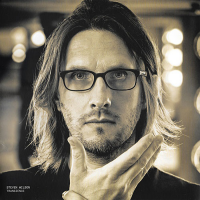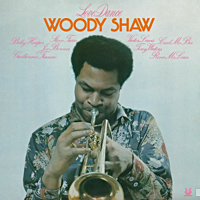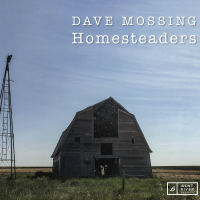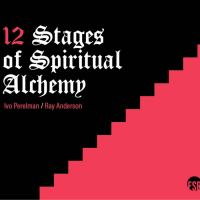Home » Jazz Articles » Multiple Reviews » Steven Wilson: Maintaining Momentum with Transience & 4 1/2
Steven Wilson: Maintaining Momentum with Transience & 4 1/2
While he released his first solo record, the acclaimed Insurgentes (Kscope), in 2009, it wasn't until the release of the even better-received double-disc follow-up, 2011's Grace for Drowning (Kscope), that, with sufficient repertoire and the formation of a touring band—which, despite occasional shifts due to scheduling issues and instrumental requirements, has remained relatively stable ever since—the singer/guitarist/keyboardist began hitting the road with a live show that may have run on a smaller budget (and initially played in smaller venues) than Porcupine Tree, but looked every bit a big-budget show, with spectacular rear projections, lighting and other visual and sonic effects.
But one of the most important things that Wilson learned from his years fronting Porcupine Tree has been the importance of momentum. In order to build a career and not just retain but continually grow his audience, Wilson understands that he needs to be a constant presence. Wilson has continued to release studio albums like clockwork every two years, with Grace for Drowning followed, first, by 2013's even more progressive-leaning The Raven That Refused to Sing (And Other Stories) (Kscope)- -an album which had become, according to Wilson at the time of his February, 2015 All About Jazz interview (coinciding with the release of his fourth studio album), ..."the most successful album of my whole career...the best-selling record I've ever done"; and, most recently, 2015's even more ambitious concept album, Hand. Cannot. Erase. (Kscope).
While still sufficiently entrenched in progressive rock to retain his growing legion of fans of that genre, Hand. Cannot. Erase. also reflects his broader interests more so than any album since Insurgentes— interests that have always been a part of his identity in side projects like Bass Communion, Incredible Expanding Mindfuck, and his decade-plus duo project with singer Tim Bowess, No-Man, amongst many others. Topping numerous charts and continuing to grow his audience beyond the conventional "grey hairs and no hairs" who largely populate the progressive rock community, Wilson's penchant for a good pop song, while easily identifiable in Porcupine Tree songs like "Lazarus," and "The Sound of Muzak," has never been so seamlessly blended with his progressive leanings, his predilection for electronics/electronica/noise music, and a multiplicity of other concerns as it is on Hand. Cannot. Erase. His world tour in support of that album- -which began at its release and has continued into 2016—been so successful that, as just one example, he sold out two nights at the 2015 Festival International de Jazz De Montréal, playing a venue that was considerably larger than Club Soda, where he'd brought The Raven tour two years earlier...and for just one night.
But beyond keeping his website and Facebook pages regularly active with news, video clips and more, Wilson has also continued to maintain momentum with additional releases since 2011. Catalogue | Preserve | Amass was self-released in February, 2012; a single-disc live album issued in a limited-run that quickly sold out and now commands well over $100 on sites like Amazon and Discogs. Get All You Deserve (Kscope, 2012) came just seven months later, documenting an entire show and released on DVD, Blu Ray, and a Deluxe Edition that included both Blu Ray and DVD, as well as two CDs housed in a hardcover book with tour photos that also placed emphasis on Lasse Hoile's stunning imagery.
Just eight months after the release of The Raven That Refused to Sing came Drive Home (Kscope, 2013), a DVD/CD or Blu Ray/CD combo that, in addition to the videos for The Raven's evocative title track and "Drive Home," one of the album's more accessible tracks, included four concert videos of material from The Raven and one live song from Insurgentes. The release also included two audio-only tracks: "The Birthday Party," a song/story that didn't make the cut for the six ghost stories that formed the basis for The Raven; and an orchestral version of "The Raven That Refused to Sing" that provided an alternative perspective to one of Wilson's most beautiful songs, along with Grace for Drowning's "Deform to Form a Star."
2014 may have been a relatively quiet year for Wilson's solo career—as he prepped Hand. Cannot. Erase for release, along with rehearsing a live show that upped the ante on what he'd done previously, as well as dealing with the recruitment of two additional musicians into the fold for tour legs that group regulars, guitarist Guthrie Govan and drummer Marco Minnemann, could not make due to scheduling conflicts. While Govan and Minnemann have been important to the chemistry of a group that also includes consistent group mainstays, keyboardist Adam Holzman and bassist/stick player/backing vocalist Nick Beggs, it ultimately turned out that guitarist Dave Kilminster (perhaps best-known for his role in ex-Pink Floyd bassist/guitarist/vocalist Roger Waters' massive solo tour of that group's The Wall from 2010-2013), and drummer Craig Blundell (better known as a clinician/technician but who has, no doubt due to his work with Wilson, also ended up on recent recordings by progressive rockers Lonely Robot and Pendragon) were more than capable of not just filling Govan and Minnemann's shoes, but making them their own.
Still, Wilson made sure that, in addition to a number of new surround and stereo mixes of classic albums by Yes, Gentle Giant, XTC, Tears for Fears and Jethro Tull, his own visibility remained a constant in 2014. First, early 2014 saw a second run of the untitled I.E.M. (Incredible Expanding Mindfuck) box, initially released in 2010 by Germany's Tone Float label in a limited run of 2,000 copies, collecting everything Wilson had recorded between 1996 and 2001 as I.E.M., and which reflected his love of '70s Krautrock: improvised music with occasional guests including Porcupine Tree alum, bassist Colin Edwin; ex-Henry Cow reed player Geoff Leigh; and drummers Chris Maitland and Mark Simnett, later edited and processed in the studio.
March brought Cover Versions (Kscope), which collected—first as a two-LP set, and then, three months later, on CD—a series of six "two song singles" first released on Tone Float between 2003 and 2010 as CD singles and 7" vinyl. Each single backed relatively low-key interpretations of songs by Alanis Morissette, ABBA,The Cure, Mommus, Prince and Donovan with a Wilson original with one exception where, instead of a Wilson track, he contributed a traditional English folk song, "The Unquiet Grave."
Then, in May, Tone Float released another untitled box set that, also in a limited run of 2,000 copies, collected a series of albums and EPs by Wilson's solo electronic project Bass Communion; originally issued, for the most part, on vinyl and now largely out of print, this box—like the I.EM. box—housed four CDs in a beautiful hard slipcase along with a booklet of artwork. May also saw the remastered reissue of the out-of-print Yellow Hedgerow Dreamscapes on Wilson's own Headphone Dust imprint, bringing some of Porcupine Tree's very earliest recordings back into print after its original cassette release...an appropriate move, since Porcupine Tree began as a solo project for a very young Wilson, and only morphed into a band when it's success demanded that Wilson put one together to play the music live.
Along with the CD issue of Cover Versions, June saw the announcement of a three-LP set on Headphone Dust, collecting Wilson's two albums as Continuum, a duo with guitarist Dirk Serries that tackled music ranging from ambient to doom metal, and which first saw the light of day on CD in 2005 and 2007.
In September, Wilson's regular reed/woodwind multi-instrumentalist Theo Travis—who toured both Grace for Drowning and The Raven but, with reduced participation on Hand. Cannot. Erase., was not included in that touring band—released Twice Around the World, an independently published book collecting revised tour blogs from his two world tours with Wilson, and which provided an unusually candid insider's look at life on the road.
Then, as Wilson and the group hit the studio to record Hand. Cannot. Erase. in September, there was even more Wilson content, this time in the form of two Kscope reissues of No-Man's final studio albums, 2003's Together We're Stranger and 2008's Schoolyard Ghosts, while October saw a vinyl repress of Wilson's Unreleased Electronic Music on Headphone Dust, a two-LP set of music recorded between 1990 and 2003.
Once Wilson released Hand. Cannot. Erase. and hit the road in support of what has become his most acclaimed recording and live show yet, there was plenty of momentum in the form of album and tour reviews...but Wilson continued to think ahead, with two recordings released four months apart, beginning in the fall of 2015—just seven months after his new studio album hit the streets. One, the EP-length 4 1/2, released on Blu Ray, CD and vinyl, will satisfy existing Wilson fans' craving for new music; the other, a three-sided double-LP (the fourth side containing an engraving of the lyrics to one of his songs) called Transience, collects of some of Wilson's more accessible music—an intelligent move given his increasingly broad audience, that will appeal to existing fans as well acting as a potent introduction. Both releases continues to build Wilson's momentum as he continues his Hand. Cannot. Erase. tour with dates— following gigs in the UK and continental Europe at the beginning of the year—in North and South America, to be followed by a return to Europe in the spring.
 Steven Wilson
Steven Wilson Transience
Kscope
2015
For his first collection of largely extant music made since he went solo in 2009, Wilson brings together some of his most accessible writing on Transience. With over 60 minutes of music spread over three sides of a two-LP set, accessible shouldn't in any way suggest lack of depth or substance. His new recording of Porcupine Tree's "Lazarus" may be a relatively faithful re-recording, but with guitarist Guthrie Govan's gritty slide guitar and Adam Holzman's always-imaginative piano work, it works as a reminder of Wilson's two decades recording and subsequently touring as Porcupine Tree. More importantly, it serves notice that—after leaving PT repertoire off the table for his first solo tour and introducing just a single early PT tune, "Radioactive Toy," as an occasional encore during The Raven tour—that Wilson is beginning to reclaim some of the massive repertoire he wrote for that group between 1987 and 2009.
But it's hearing the entire 13-song collection, back-to-back, that demonstrates how unfair it has been, perhaps, to categorize Wilson so decidedly in the progressive rock camp when he has always been much broader. He may prove, with songs like Grace for Drowning's "Postcard" and, in particular, the especially beautiful "Deform to Form a Star," that he likes to work with some of the more recognizable colours of prog rock—most notably his love of the analog tape-driven mellotron that so defined groups like the Moody Blues, King Crimson, Yes and Genesis in the late '60s/early '70s, as well as other analog textures like Fender Rhodes, Hammond organ and MiniMoog—but he's always been a sonic experimenter and collector, with his use of Michiyo Yagi's 17-string bass koto on Insurgentes' wonderfully constructed yet, at its core, compositionally simple title track just one example. That album's opener, "Harmony Korine," may also revolve around a relatively simply idea but, as Wilson builds the tune from arpeggiated guitars and mathematically precise drums to a chorus that's all aggro distorted guitars and harsh keys, it becomes immediately clear how much sense his relationship with Opeth's Mikael Åkerfeldt has made...and how his interest in some of the most extreme metal and noise music imbued Porcupine Tree's music at times, but in ways that were somehow more eminently easy to digest.
With the overall concept and running order of Hand. Cannot. Erase., it's hard to imagine any of its music taken out of order—and, even more so, out of context. But just as Wilson has divided the music up live and placed other material in its midst, here the inclusion of that album's folkloric "Transience," the pure pop of its pulsating title track (despite being in 9/4) and, perhaps most significantly, his extraction of "Happy Returns"—the album's heartbreakingly poignant vocal closer, with some of Wilson's most evocative (yet still subtle) vocal work to date and a guitar solo from Govan that's not just an album highlight but, in its concision and structural perfection, one of his best with Wilson to date—demonstrate that as much as they work so very well together they also work equally as distinct and separate entities.
Given The Raven's progressive leanings, it's also perhaps surprising, upon hearing "The Pin Drop" and "Drive Home," just how easily digestible they are, despite being on an album filled with complexity and detail...just two more examples of Wilson's ability to marry memorable melody with greater structural depth. "Drive Home" may be episodic in nature, but at its core it's still a song with definable verses and choruses that Wilson has simply expanded into a larger compositional construct.
Sonically, Transience's mastering for vinyl is surprisingly rich and deep, though full disclosure must admit that, without a turntable, this review is of WAV files provided that were used to cut the LPs. Still, irrespective of the format, bringing the sound worlds of music from five albums—Wilson also includes his spare version of Alanis Morissette's "Thank You," from Cover Versions, along with the new version of "Lazarus"—together to form a cogent, consistent-sounding program is no mean feat. And yet—no surprise, coming from a musician who has spent as much time behind a sound board and a computer as he has writing and performing—Transience manages to accomplish precisely that.
Wilson's strength on Transience is in choices and sequencing that will, no doubt, draw people who claim to "hate" progressive music right into it on pieces like "The Pin Drop" and Grace for Drowning's brooding "Index," while recognizing that Wilson is far from retro and is, instead, a thoroughly contemporary artist. Constantly on the lookout for new ways to bring disparate sonics and musical concepts together, Wilson draws upon the broadest possible sources to fashion music that continues to evolve with each passing year...and which has already achieved that most desirable of goals: being instantly recognizable.
An album that stands on its own and which, with edited versions of some of the material, has plenty of appeal for existing Wilson fans, Transience is also a recording for those who are relatively new to some of the sounds and constructs found across its 13 songs, but who may well find themselves compelled to dig into Wilson's full back catalog once they've finished spinning it.
 Steven Wilson
Steven Wilson 4 1/2
Kscope
2016
Bookended by two pieces approaching the ten-minute mark, the six-song, 37-minute 4 1/2 acts as an interim album between Hand. Cannot. Erase. and studio album number five. While some of the music dates a long way back, the majority of it was finished over the past couple of years. In fact, those who purchased the expensive (but absolutely beautiful) deluxe hardcover editions of Hand. Cannot. Erase. and The Raven That Refused To Sing (And Other Stories) may be slightly miffed that three pieces on 4 1/2 began as pieces written and recorded during those sessions and yet were not included as extras on those special editions.
Still, the truth is that musicians often record more than they release, and only find their way back to those unreleased and often unfinished ideas/songs later—sometimes many years later. An example is "Happiness III," a song Wilson first wrote in 2003, but was later recorded as part of the Hand. Cannot. Erase. session. A strong song, with lyrics that make sense in the context of the album's overall narrative, it's also easy to see why it didn't make the cut for the album, in the same way that a movie director may film some terrific material that, in the end, simply doesn't work because it either slows the narrative down or, worse, deflects from it completely. A relatively straightforward song that also makes sense as being written during Wilson's years with Porcupine Tree—especially in context of the music he was writing for the group's follow-up to 2002's superb In Absentia, Deadwing (Lava, 2005)—it may be performed to excellence by Wilson's core touring group of keyboardist Adam Holzman, bassist/stick player/vocalist Nick Beggs, guitarist Guthrie Govan and drummer Marco Minnemann, but it still feels somehow different from Hand. Cannot. Erase.'s overall vibe and ambience.
More impressive is the lengthy album closer, "Don't Hate Me," first performed by Porcupine Tree on one of its best records, Stupid Dream (Madfish/Snapper, 1999). While the overall structure is not dissimilar to the original, the performances of Wilson's group—this time, with Holzman and Beggs joined by guitarist Dave Kilminster and drummer Craig Blundell—elevate it to a whole new level, with the primary backing tracks culled from a live concert in Europe during 2015. Adding singer Ninet Tayeb to share the vocals with Wilson and bringing Theo Travis back for some searing saxophone work and atmospheric flute playing (he also played on the original PT version) renders it stronger still. Holzman shines as well, first with a Fender Rhodes solo that, like Travis, demonstrates the value being versed in the jazz vernacular can bring to a progressive rock context such as this. Kilminster also takes a scorching solo at the song's end and, together with Blundell, finally make their first recorded appearances with Wilson on 4 1/2.
Kilminster and Blundell, in fact, dominate the EP's group tracks; they are also part of the opening "My Book of Regrets"—a new composition that Wilson began playing in the midst of his 2015 tour. Another nine-minute epic, with its backing track taken, this time, from one of Wilson's two Montreal Jazz Festival shows in June 2015, it's initially a guitar-driven rocker that gradually morphs into a more episodic and, yes, progressive-leaning track where Beggs' thundering bass playing is definitive, before opening up to an impressive MiniMoog solo from Holzman and an equally stunning solo from Kilminster. He may be slightly more "old school" than Govan—he did, after all, play "David Gilmour" for nearly four years on tour with Roger Waters' The Wall—but he's no less impressive...and, at times, proves to be an even tastier player when it comes to tone.
What has become increasingly clear, however, is that while Wilson now has two terrific guitarists and drummers from which to choose when it comes to scheduling his tours, the two band members that appear irreplaceable—along with Travis, who was only left off the Hand. Cannot. Erase. tour because his participation on the album was minimal, but who clearly remains Wilson's reed and woodwind player of choice—are Beggs and Holzman. Time and circumstances may prove that to be untrue, but at the moment it just seems impossible to imagine any album without these two increasingly significant players in the Wilson universe.
Another player who, gigging briefly with Wilson when Minnemann was unavailable during The Raven tour, and played on one of Hand. Cannot. Erase.'s key tracks ("Happy Returns"), makes a return appearance on 4 1/2. Though one look at his resumé and a listen to any of his own albums demonstrates no shortage of chops and facility, the somewhat less muscular approach that made Chad Wackerman a less than ideal replacement for Minnemann makes him perfect for "Sunday Rain Sets In," one of three instrumental tracks on 4 1/2, and another unused piece from the Hand. Cannot. Erase. sessions. Largely defined by its ethereal atmosphere, including Travis' rich flute and Wilson's own spare guitar work, the composition is suddenly broken up unexpectedly, three minutes into its four-minute run, by a brief but aggressively repeated riff, before dissolving, once again, into celestial atmospherics.
4 1/2's remaining tracks are instrumentals that are more clearly studio concoctions, especially "Year of the Plague," where Wilson layers no less than four instruments himself, along with samples of an additional four more, with Holzman the only other contributor to the track. Even more atmospheric than "Sunday Rain Sets In," it also ultimately possesses more definitive form as Wilson's arpeggiated acoustic guitar is slightly redolent of Ralph Towner (he's also a fan of Germany's ECM Records), while Holzman's piano is less a dominant voice and more an integrated part of the entire soundscape. "Vermillioncore," on the other hand, is more of a group effort, despite Blundell's drums being recorded separately at a different studio. Still, despite its brief five-minute run, the piece runs the gamut from bass-driven funk to more metallic overtones and a rapid-fire double-time ending segment that brings it all back together. Sharing a bit of the same vibe as The Raven's "Luminol," it's a track that could be turned into a smoking live show-stopper.
It may only last slightly over 37 minutes, but 4 1/2 has so much going on that it feels much longer— in a good way. Rather than feeling like a collection of disparate tracks brought together as a stop-gap between two proper releases, 4 1/2 has its own identity, demonstrates growth in Wilson's overall concept and hangs together as an entity unto itself. Because of its content, Wilson's last EP-length release, Drive Home—consisting largely of live performances of music from The Raven, in addition to two videos and two audio-only tracks—had the feel of something meant to fill a need but also fill space. 4 1/2, on the other hand, deserves to be considered as proper release. With five new pieces and an upgrade to an older Porcupine Tree tune that, with the energy of its live backing track, ups the ante considerably, 4 1/2 should more than keep Wilson fans happy as he continues to tour...and prepare for album number five.
Tracks and Personnel
Transience
Tracks: S1: Transience-single version; Harmony Korine; Postcard; Significant Other; Insurgentes. S2: The Pin Drop; Happy Returns; Deform to Form a Star-edit; Thank You. S3: Index; Hand Cannot Erase; Lazarus-2015 recording; Drive Home.
Personnel: Steven Wilson: programming (S1#1, S2#2, S3#1-2), Mellotron M4000 (S1#1, S2#2, S3#2), keyboards (S1#1-3, S2#1, S2#3-4, S3#1, S3#3-4), vocals (S1#1-5, S2#1-4, S3#1-3), string arrangements (S1#1, S2#2), hammered dulcimer (S1#1), guitars (S1#1, S1#3, S2#1, S2#3, S3#1, S3#4), electric guitars (S1#2, S1#4, S2#2, S3#2), bass guitar (S1#3, S1#5), piano (S1#3, S2#4), electric piano (S1#4), glockenspiel (S1#4), celeste (S1#4), acoustic guitars (S1#4, S2#2, S2#4, S3#-3), harmonium (S#5), guitar loops (S1#5), mellotron (S2#1, S3#4), effects (S1#2), Hammond organ (S2#4), autoharp (S3#1), arranger, London Session Orchestra (S3#1), shaker (S3#2); Adam Holzman: piano (S1#1, S2#1-2, S3#2-4), celeste (S1#1, S3#2), Hammond B3 organ (S1#1, S2#1-2, S3#2, S3#4), Fender Rhodes (S1#1, S2#1, S3#2, S3#4), MiniMoog (S2#1, S3#4), keyboards (S3#3); Guthrie Govan: guitars (S1#1, S2#2), lead guitar (S2#1, S3#4), slide guitar (S3#3); Marco Minnemann: drums (S1#1, S2#1, S3#2-4), percussion (S2#1, S3#4); Nick Beggs: backing vocals (S1#1, S2#1-2 S3#3-4), bass guitar (S1#1, S2#1, S3#2, S3#4), Chapman Stick (S2#2, S3#3); Ninet Tayeb: vocals (S1#1), backing vocals (S3#2); Dave Stewart: string arrangements (S1#1), arranger and conductor, London Symphony Orchestra (S1#3), arranger and conductor, choir (S1#3), boy's choir arrangement (S2#2), string arrangement (S2#2, S3#4), orchestrator, London Symphony Orchestra (S1#1); Theo Travis: flutes (S1#1, S2#1, S3#4), baritone saxophone (S1#1), saxophones (S2#1, S3#4), clarinets (S2#1, S2#3, S3#4); The London Session Orchestra (S1#1, S3#4); Gavin Harrison: drums (S1#2, S1#4); Nic France: drums (S1#3, S2#3); Tony Levin: bass guitar (S1#4, S2#3); Clodagh Simmonds: vocals (S1#4); Michiyo Yagi: 17-string bass koto (S1#5); London Session Orchestra: strings, arranged by Dave Stewart (S1#4); Perry Montague-Mason: violin (S1#4, S3#4); Dave Gregory: additional guitar (S2#2), Rickenbacker 12-string guitar (S3#2); The Cardinal Vaughan Memorial School Choir (S2#2); The London Session Orchestra (S2#2); Chad Wackerman: drums (S2#2); Jordan Rudess (S2#3); Pat Mastelotto: drums (S3#1), electronic drums (S3#1).
4 1/2
Tracks: My Book of Regrets; Year of the Plague; Happiness III; Sunday Rain Sets In; Vermillioncore; Don't Hate Me. Blu Ray Bonus: Lazarus (2015).
Personnel: Steven Wilson: vocals (1, 3, 6-7), autoharp (1), acoustic guitars (1-3,7), electric guitars (1, 3), mellotron (1, 4, 6), piano (1), percussion (1, 4), ghostwriter IV (1), bass guitar (2, 5), electric piano (2), Prophet 6 synthesizer (2, 6), various sampled instruments (violin, boys choir, glockenspiel, orchestral percussion) (2), guitars (4-6), keyboards (4-5, 7), sound design (5), Moog synthesizer (6); Adam Holzman: Wurlitzer (1, 5), Hammond organ (1, 3, 6), MiniMoog (1, 5), piano (2-4, 7), organ stabs (5), Fender Rhodes (6), keyboards (6-7); Dave Kilminster: guitars (1, 6); Nick Beggs: bass guitar (1, 3-4, 6), stick (5), Chapman stick (7), backing vocals (7); Craig Blundell: drums (1, 5-6), electronic drums (5); Guthrie Govan: guitars (3), slide guitar (7); Marco Minnemann: drums (3, 7); Chad Wackerman: drums (4); Theo Travis: flute (4, 6), saxophone (6); Ninet Tayeb: vocals (6).
Tags
steven wilson
Multiple Reviews
John Kelman
United Kingdom
London
King Crimson
Yes
Jethro Tull
Emerson, Lake and Palmer
Adam Holzman
Pink Floyd
Henry Cow
Theo Travis
Kscope
Michiyo Yagi
Ralph Towner
About Steven Wilson
Instrument: Composer / conductor
PREVIOUS / NEXT
Support All About Jazz
 All About Jazz has been a pillar of jazz since 1995, championing it as an art form and, more importantly, supporting the musicians who make it. Our enduring commitment has made "AAJ" one of the most culturally important websites of its kind, read by hundreds of thousands of fans, musicians and industry figures every month.
All About Jazz has been a pillar of jazz since 1995, championing it as an art form and, more importantly, supporting the musicians who make it. Our enduring commitment has made "AAJ" one of the most culturally important websites of its kind, read by hundreds of thousands of fans, musicians and industry figures every month.






















